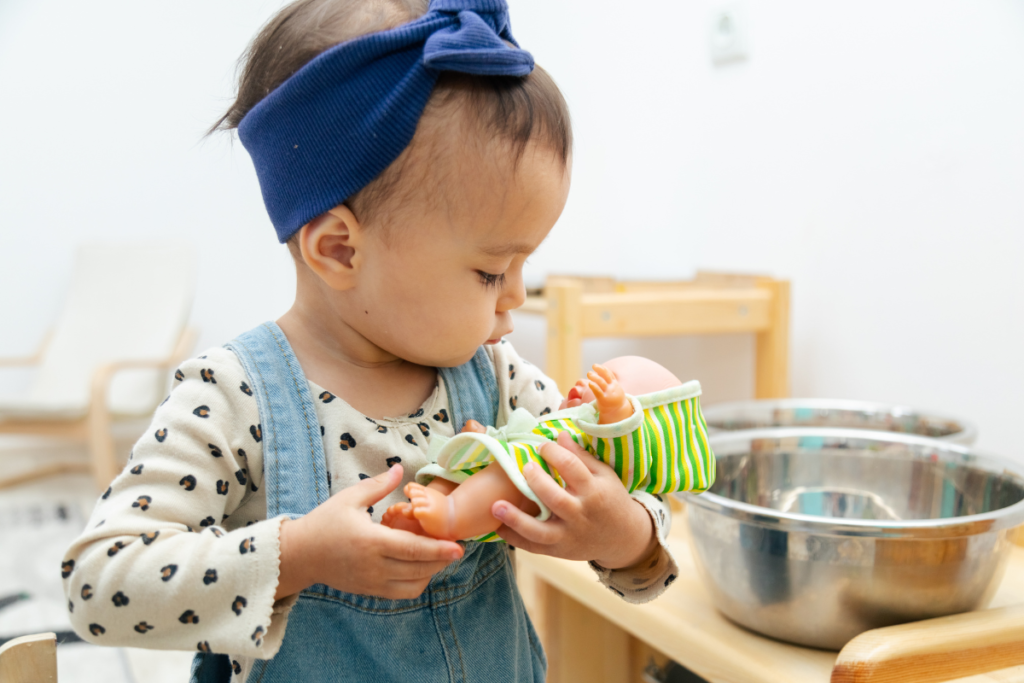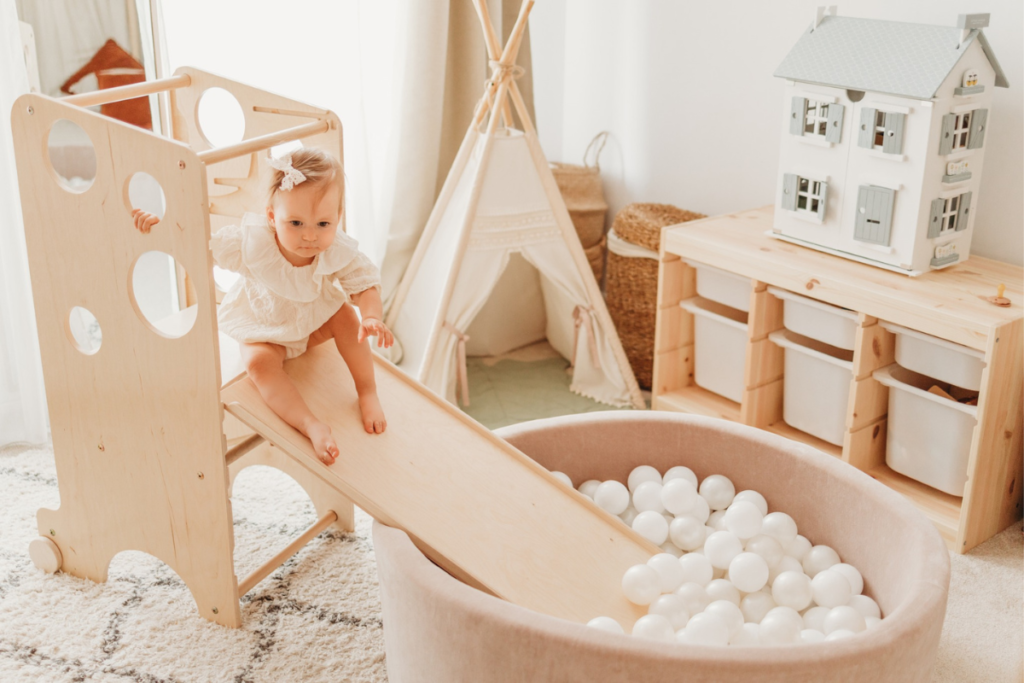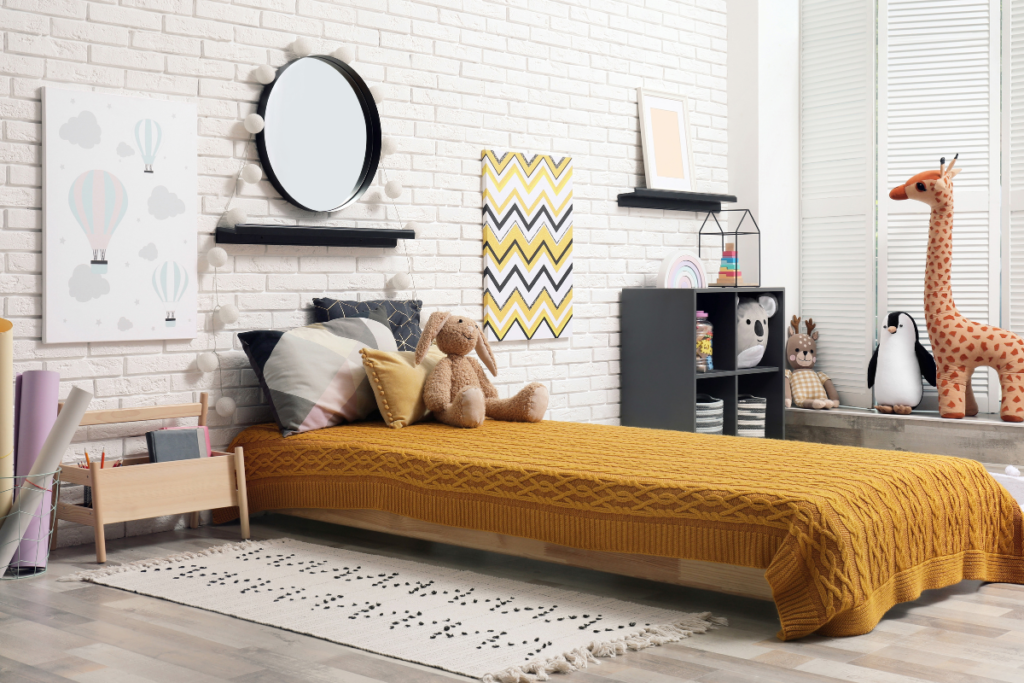Montessori dolls are an excellent tool for teaching and learning. They are aligned with the Montessori method and promote open-ended play and creativity. These educational dolls are designed to support the development of fine motor skills and allow children to explore concepts such as visual discrimination, order, and symmetry. Let’s explore the world of Montessori dolls and discover the benefits they offer for your child’s growth and imagination.
Key Takeaways:
- Montessori dolls promote open-ended play and creativity
- They support the development of fine motor skills
- Montessori dolls allow children to explore concepts such as visual discrimination, order, and symmetry
- They are aligned with the Montessori method of education
- Montessori dolls stimulate imagination and promote holistic development
What Makes a Doll Montessori-Aligned?
Montessori-aligned dolls and dollhouses are designed with natural materials like wood, which provide a tactile and sensory experience for children. Unlike traditional dolls, Montessori dolls emphasize simplicity and realism, allowing children to engage in open-ended play and foster their creativity and imagination. The dollhouses in the Montessori-inspired play environment should have realistic furnishings to encourage imaginative play and reflect the world around them. By replacing plastic furniture with wooden pieces, children can create a more Montessori-like environment that promotes a sense of order and beauty.
In addition to the choice of materials, Montessori toys, including dolls, are designed to minimize distractions. They often feature muted colors and avoid excessive noises and bright lights to promote focus and concentration. Montessori dolls are meant to engage children in meaningful play that encourages independent exploration and problem-solving. By providing children with simple, realistic, and age-appropriate dolls, parents and educators can support their development and create an environment that nurtures their natural curiosity and love for learning.
What Makes a Doll Montessori-Aligned?
Dolls that are considered Montessori-aligned are made from natural materials like wood and have realistic features. These dolls are designed to stimulate a child’s senses and encourage hands-on exploration and imaginative play. Montessori dolls also promote independence, as children can dress and undress them, fostering the development of fine motor skills.
Montessori doll clothes are often simple and easy to manage, allowing children to practice dressing themselves and developing self-care skills. The materials used for doll clothes are typically soft and natural, such as cotton or linen, providing a tactile experience for children as they engage with the dolls.
| Doll Material | Benefits |
|---|---|
| Wood | Provides a sensory experience, durable, promotes open-ended play |
| Cotton or Linen | Offers a tactile experience, easy to manage, encourages independence in dressing dolls |
| Natural Fibers | Safe for children, environmentally friendly, promotes sustainability |
When choosing Montessori dolls, it is important to consider the materials used, as well as the overall design and features of the dolls. By selecting dolls that are aligned with the Montessori philosophy, parents and educators can provide children with toys that support their development and nurture their natural curiosity and love for learning.
Types of Montessori Dolls and Their Benefits
Montessori play includes a variety of dolls that provide unique benefits for your child’s development. Let’s explore different types of Montessori dolls and the advantages they offer:
Nesting Dolls
Nesting dolls, also known as Matryoshka dolls, are a popular choice in Montessori play. These dolls consist of a set of wooden dolls of decreasing sizes that fit inside each other. Nesting dolls help children develop their visual discrimination skills as they explore the concept of comparison and order. The activity of nesting and stacking the dolls also promotes fine motor skills and hand-eye coordination.
Peg Dolls
Peg dolls are simple wooden dolls with a cylindrical body and a head, allowing children to use their imagination and creativity in play. These dolls come in different designs and colors, providing opportunities for color learning and free-form play. Peg dolls can be used for storytelling, role-playing, and creating small worlds, encouraging imaginative play and language development.
Realistic and Anatomically Correct Dolls
Realistic and anatomically correct dolls are designed to resemble real babies or children. These dolls promote social-emotional skills and help children develop empathy and nurturing abilities. Anatomically correct dolls educate children about the human body’s anatomy and diversity. Playing with these dolls encourages exploration, role-playing, and understanding of different physical features and cultural backgrounds.
Each type of Montessori doll offers unique benefits, allowing children to engage in meaningful and educational play experiences.
| Type of Montessori Doll | Benefits |
|---|---|
| Nesting Dolls | Develop visual discrimination, fine motor skills, and hand-eye coordination |
| Peg Dolls | Promote imaginative play, storytelling, and language development |
| Realistic and Anatomically Correct Dolls | Foster social-emotional skills, empathy, and understanding of diversity |
By introducing different types of Montessori dolls into your child’s playtime, you can support their cognitive, physical, and emotional development in a fun and engaging way.
Benefits of Montessori Doll Play
Montessori doll play offers numerous benefits for children. It helps develop fine motor skills through activities like dressing and undressing dolls. When children manipulate the tiny buttons and fastenings on doll clothes, they enhance their dexterity and hand-eye coordination. This promotes the development of their motor skills, which are crucial for tasks like writing, drawing, and self-care.
In addition to fine motor skills, Montessori doll play enhances focus and concentration. As children engage in imaginative play with the dolls, they immerse themselves in a world of make-believe. This requires sustained attention and concentration, training their minds to stay focused for longer periods. Improved focus and concentration are valuable skills that can benefit children in various aspects of their lives, such as academic tasks and problem-solving.
Another advantage of Montessori doll play is the encouragement of creativity. Children can use their imaginations to create stories and scenarios for their dolls. This open-ended play allows for limitless possibilities and fosters creativity and innovative thinking. By engaging in imaginative play, children develop their ability to think outside the box, problem-solve, and express their unique ideas.
Nurturing Self-esteem and Imagination
Playing with Montessori dolls can also boost self-esteem and confidence. When children interact with dolls that resemble them or reflect their cultural backgrounds, it helps them develop a positive self-image. They see themselves represented and can project their identities onto the dolls, nurturing a sense of self-worth and acceptance. This can have a profound impact on their self-confidence and overall well-being.
Furthermore, Montessori doll play encourages the development of imagination. Children can create elaborate stories and scenarios for their dolls, transporting themselves to different worlds and situations. This active use of the imagination stimulates cognitive growth and linguistic development. It also provides an outlet for self-expression and emotional exploration, allowing children to make sense of their feelings and experiences in a safe and imaginative way.
| Benefits of Montessori Doll Play |
|---|
| Develops fine motor skills |
| Enhances focus and concentration |
| Encourages creativity |
| Nurtures self-esteem and confidence |
| Fosters imagination |



